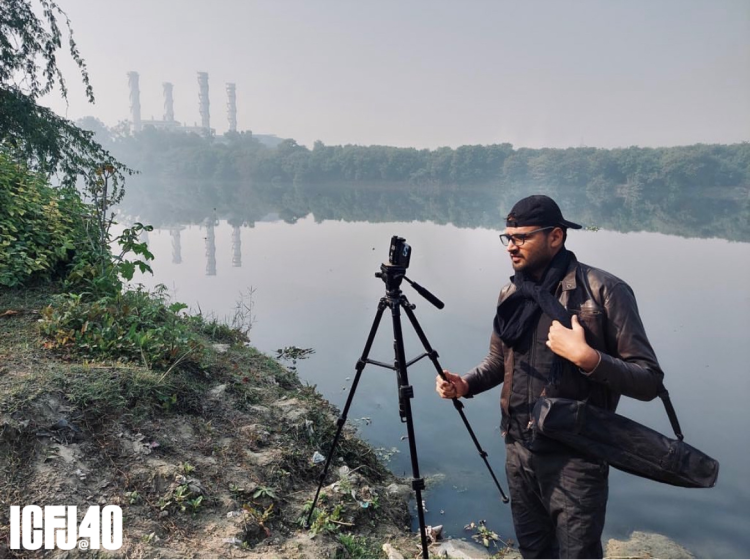Rohit Upadhyay is an Indian journalist who covers human rights, culture, public health and environmental issues. His YouTube channel has nearly 750,000 subscribers.
Through an ICFJ program, he gained knowledge, networked, and collaborated with South Asian colleagues “to shed light on the challenges faced by minority journalists in Pakistan, Sri Lanka and India.”

This interview has been edited slightly.
How have you been involved with ICFJ over the years?
I was selected for the ICFJ South Asia Religious Freedom program in Colombo, Sri Lanka. This program gave me a chance to meet journalists from Sri Lanka and Pakistan, which was an amazing opportunity. We learned from each other and discussed regional issues, helping me understand the challenges in South Asia more deeply. This experience was invaluable for my personal and professional growth.
What was the biggest outcome from participating in the program?
I always wanted to know about the situation of Hindu and Christian minority journalists in Pakistan, but online, I mostly found stories about their torture and targeting. This program gave me the chance to collaborate with a journalist from Pakistan and Sri Lanka to shed light on the challenges faced by minority journalists in Pakistan, Sri Lanka and India. Together, we created a report detailing the problems these journalists encounter in their respective countries.
Our findings were deeply concerning.
Minority journalists are targeted by government authorities, face false charges, and are often labeled as terrorists. They struggle to gain access to ministries due to a lack of trust and are frequently targeted by local politicians. Through this report, we aim to highlight the serious issues faced by these vital watchdogs of democracy.
What are you currently working on that you’re excited about?
I am currently covering minority rights in India and am about to launch a series of stories from the conflict zone of Jammu and Kashmir. In this series, I aim to highlight the concerns, issues and perspectives of the people living there. Through these stories, I hope to shed light on their experiences and thoughts about Kashmir and India.
What kind of difficulties as a journalist have you faced in India?
As a journalist covering minority rights, I have faced significant challenges, including online abuse, death threats, police notices, doxing and relentless trolling. Given that I primarily produce videos and have more than a million followers on my social media accounts, I receive hate messages almost every minute. Despite these threats, I remain committed to shedding light on important issues and giving a voice to marginalized communities.
Why did you choose to become a journalist?
Sometimes you don't choose the profession; the profession chooses you. As a teenager, I dreamt of traveling across my country on a bike and meeting my fellow countrymen. To pursue this dream, I joined a media institute, hoping to travel and highlight the issues faced by my fellow citizens. However, after working in almost all the mainstream Indian media houses for five years, I became comfortable in the system and somewhat forgot my dreams.
One day, while going through an existential crisis, I recalled the words of Mahatma Gandhi, which were published in my school textbooks. His talisman states: "Whenever you are in doubt, or when the self becomes too much with you, apply the following test. Recall the face of the poorest and the weakest man [woman] whom you may have seen, and ask yourself, if the step you contemplate is going to be of any use to him [her]. Will he [she] gain anything by it? Will it restore him [her] to a control over his [her] own life and destiny? In other words, will it lead to swaraj [freedom] for the hungry and spiritually starving millions? Then you will find your doubts and your self melt away."
These words reignited my passion and reminded me of my purpose: to bring attention to the struggles of the marginalized and to contribute to their empowerment through my journalism. I left my mainstream job and started a YouTube channel, reporting on important issues while traveling around on my motorbike. Since then, I've been doing what I love, combining my passion for travel and journalism.
What’s one piece of advice you’d give to an aspiring journalist?
Your stories and writings are a testament, a memory that outlives any human experience. Your pen has the power to inform, educate and inspire change. Keep writing, and keep informing and educating people. Every story matters; journalism matters.